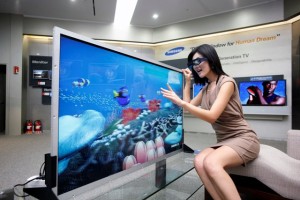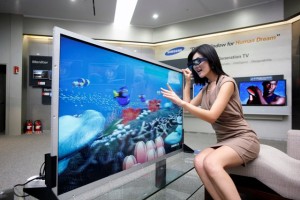Gaining Popularity: Smart TV in China
China’s TV market demand is gradually shifting from the low-end to high-end, with the gradual improvement of products, smart TV will accelerate the popularity. All View Cloud data show that as of the end of 2015, total Chinese smart TV amounted to 105 million units with the activation rate of 83% and terminal active users reached 41 million. From the perspective of the demand structure, in 2016, the new demand for smart TV is 4 million 550 thousand units, accounting for 10%; the demand of original family for second purchase is 7 million 40 thousand units, accounting for 15%; the amount of replacement is 35 million 840 thousand units, accounting for 75%. With the increase of Internet applications and intelligent as the center, the TV content is constantly enriched and improved, the TV ecology gradually mature, smart home values began to show.
Market Background: Smart TV in China
The TV industry was difficult in 2015. The global shipments of TV were 230 million units, at an annual decrease of 2.5%. Despite the global market slump, China’s TV industry is still growing. The retail sales of China’s TV market were 46 million 740 thousand units in 2015, at an increase of 4.8%. This growth has been overdraft consumer demand. With the difficulty in the growth of total market size, TV intelligence has become the main direction of the TV manufacturers to break through.
At the same time, the smart TV penetration rate has reached 73%, with the activation rate of 83%. As of the end of 2015, the amount of television held by citizens is more than 100 million units. On this basis, the smart TV Set-Top Box sales are also more than 60 million units. This shows that the video environment based on the TV scene has been mature, and the profit model is gradually clear. It is predicted that in 2016 the TV sales will reach 47 million 390 thousand units, rose by 1.4%; the sales revenue will be 161 billion 100 million yuan, an increase of 2.5%. Online sales will account for 32%, rural sales will account for 52%.
With the advent of the era of smart TV, TV replacement cycle gradually reduced to 3-5 years. The resulting new replacement demand is currently the main source of new shipments. IDC forecast, China’s TV market faces conversion from incremental market to the stock market.
Smart home –the New Hotspot for investment
 In 2018, the global smart home market will reach $71 billion, the market share of China will reach 32%. In the long run, the smart home market will be undoubtedly the order of hundreds of millions.
In 2018, the global smart home market will reach $71 billion, the market share of China will reach 32%. In the long run, the smart home market will be undoubtedly the order of hundreds of millions.
For TV application downloads, people at thirties and forties are the main consumers, accounted for about 70%. Game applications are the most popular smart TV application. In 2015, smart TV market penetration will exceed 85%, Apps like games, video, and preschool education will continue to occupy the mainstream market. However, there are still four major bottlenecks in the smart home industry: the lack of chip technology, hardware creativity, innovative platforms with the appropriate service. The key to solving the problem lies in the construction of the ecological system, which is the main reason, Google, Samsung, HUAWEI, and other giants have integrated the upstream and downstream industry chain.
Relying on the Internet of Things, cloud computing, big data and the rapid development of the ultra-broadband network, the development of smart home market finally usher in spring. Google acquired NEST and troops into the smart home industry. Later apple introduced a new smart home platform–HomeKit. 60% of the global TOP 100 telecom operators plan to enter the smart home market. In 2016, the world’s largest video-on-demand service provider Netflix will set into China, further stimulate the user’s demand for high-quality broadcast. Currently, Vance is trying to integrate the wisdom of community services and smart home service, which has been conducted in communities in Shenzhen, Shanghai, Chengdu and other areas of the China. Haier U+ smart ecosystem has repeatedly appeared. Modea is also trying to create a “1+1+1” strategy. to the latest, GREE said that it will focus on energy and environment for the development of smart home. By 2020, smart TV penetration rate will reach 93% to a conservative estimate. China has 400 million families, if the average annual cost per family is 10000 yuan, it will generate 4 trillion RMB in the market.
The need of improvement in User Experience for the Smart TV in China
The vast majority of television and mobile phones are based on the development of the Android system, therefore, a lot of operating steps are similar. But for the remote control of the TV, its flexibility is much less than the touch screen of a smartphone. In addition, the quality of smart TV application is generally not high. Many manufacturers that are advertising their TV has tons of applications while the majority of the applications are directly transplanted from the mobile, and some do not even has any optimization, which results in a poor user experience.
As an added value of smart TV products, video and games are defined as two core business. But compared with the popular video application, the game apps gain little interest. The game application on smart TV is still restricted by various factors. Smart TV in software and hardware also need to improve. From this perspective, the video service is the core demands of the smart TV users, in addition, the game apps can be regarded as the highest value-added applications. A new study has predicted that in 2016 the global video game market will reach $27 billion 900 million, and showing a steady growth year after year.
To know more about China’s market, follow us on LinkedIn or contact us at dx@daxueconsulting.com















